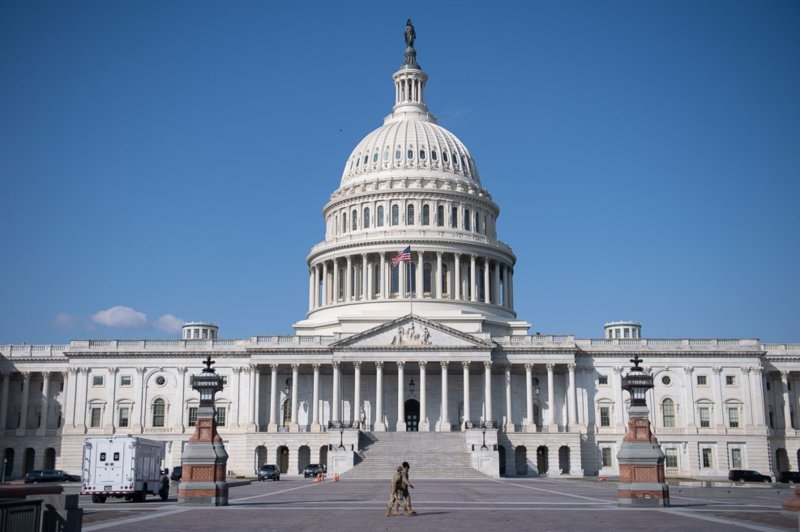1 of 5 | Congress is facing a deadline to pass a new federal spending bill to avoid a shutdown and raise the debt ceiling so the U.S. can borrow money. File Photo by Kevin Dietsch/UPI |
License Photo
Sept. 20 (UPI) -- Democratic leaders on Monday announced they will insert a measure raising nation's debt ceiling into a bill to fund government operations in a move likely to spark a showdown with Republicans.
Senate Majority Leader Chuck Schumer and House Speaker Nancy Pelosi said in a joint statement that a suspension of the U.S. debt limit through December 2022 will be part of must-pass legislation to fund the government through the end of this year and avoid a government shutdown.
Republicans have refused to vote to raise the debt ceiling, claiming it should be done by Democrats alone as part of their $3.5 trillion bill to expand country's social infrastructure and fund climate policy.
Democrats, however, insist the debt ceiling should be raised on a bipartisan basis since the policies of both parties have contributed to the ever-rising U.S. national debt.
"We believe a suspension of the debt limit through December 2022 would provide an amount of time commensurate with the debt incurred as a result of passing last winter's bipartisan $908 billion emergency COVID relief legislation, which was authored by Republican Senators Cassidy, Romney, Portman, Collins and others -- and ultimately voted for by more than 40 Republicans -- including Senator [Mitch] McConnell -- and signed into law by the previous president," Schumer and Pelosi said.
The House and Senate face a Sept. 30 deadline to pass a funding bill, and to raise the debt ceiling so the federal government can pay its bills. If the debt ceiling is reached, it becomes difficult for the U.S. Treasury to borrow money.
Republicans have said they won't go along with the plan, leading Democrats to effectively dare GOP lawmakers to put the federal government in such a precarious fiscal position.
When Donald Trump was president, top Republicans like McConnell repeatedly said that raising or suspending the debt ceiling was a top priority.
"Democrats have chosen a partisan path on spending," McConnell tweeted earlier this month. "They want to tax and spend historic sums on radical, far-left policies with no Republican votes and no Republican input. But first, they're demanding Republicans help lift their credit limit to make it happen? That's absurd."
During Trump's presidency, the Republican-dominated Congress suspended the debt ceiling three times. Congress worked out a deal to suspend the debt limit for two years in 2019 with a new limit being set on Aug. 1 at around $28.5 trillion.
The debt ceiling fight is just one of the major issues on the agenda as the Congress came back into full session with the return of House lawmakers after their August recess.
Lawmakers have said they will get to work on several bills and proposals that also include avoiding a federal shutdown and passing a bipartisan $1 trillion infrastructure bill.
The House interrupted their recess briefly late last month to advance two key parts of President Joe Biden's agenda, the bipartisan infrastructure bill and a $3.5 trillion spending resolution that includes funding for a number of Democratic priorities.
Pelosi has indicated that there will be a vote on the infrastructure bill on Sept. 27.
The bill, which was passed by the Senate last month, is under threat from Rep. Pramila Jayapal, D-Wash., and dozens of other progressive Democrats who said they'll vote against it if the spending resolution isn't completed.
Another chief priority for House Democrats on their return Monday is taking action to offset Texas' restrictive new abortion law. Pelosi has vowed to move to codify Roe vs. Wade into federal law, which would render the issue moot in federal courts.
The controversial Texas law bans abortions as soon as six weeks into pregnancy, whenever a fetal heartbeat is detected -- a time when most women don't even know they're pregnant.
Pelosi has said the House will work to advance the Women's Health Protection Act, which aims to codify abortion rights into federal law and guarantee the practice for women nationwide.
The Texas law has drawn widespread condemnation as overly intrusive and Biden's Justice Department has pledged to use all possible means to oppose it. Among other things, the law allows any Texas resident to sue women who seek an abortion.
The law also allows residents to sue those who aid women in seeking abortions, even if that means giving them a ride to the clinic. Early this month, the U.S. Supreme Court refused an emergency injunction against the Texas law.
Monday, the House rules committee debated the proposal, with Democrats on the panel insisting that the new federal statute is needed.
"The Texas law is unbelievable," said Rep. Jamie Raskin, D-Md., while Rep. Norma Torres, D-Calif., added, "The radical and extreme Texas bill bans abortion before most women even realize they're pregnant. It makes no exception for rape or incest and enables vigilante justice."
Ranking Republican member Tom Cole of Oklahoma, however, argued the Women's Health Protection Act is a "deeply misguided and truly unprecedented piece of legislation" that would preempt "common sense regulations that protect the unborn."















